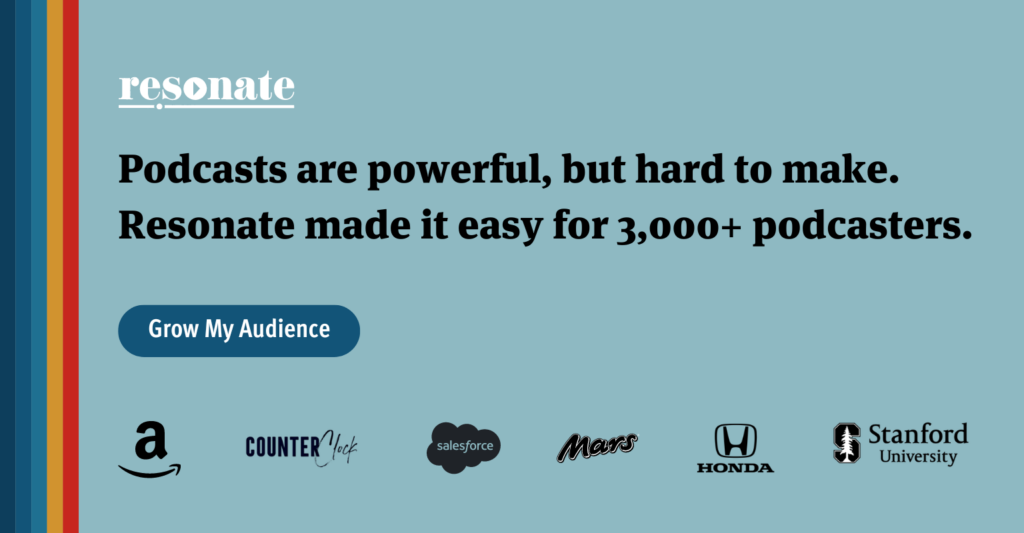Podcasting is a lasting trend these days in the world of communication and marketing.
One of the beautiful things about podcasting is that it’s not limited to entertainers and public figures. Anyone can have a podcast, including businesses and brands! In fact, they should.
Through the past few years, we’ve seen more and more household brands come onto the podcasting scene; brands like Twitter, Honda, Trader Joe’s, Sephora are just a few to have joined the podcasting nation!
Here are a few reasons that businesses have jumped on the podcast train:
1. Current and potential customers are listening to podcasts.
Podcasting is continuing to grow in popularity, meaning there is an opportunity for your business to reach those people!
2. It builds brand identity through storytelling and education.
Podcasting provides a unique opportunity to dive deeper into the topics in your field, both from your company and other industry experts, as well as share compelling stories related to your business, which is an indirect way of establishing a trusting relationship with consumers for your business.
3. It’s one of few cost effective ways to engage your audience for 30-45 minutes.
In comparison to other forms of advertising (i.e. PPC, tv commercials, radio ads, etc.) podcasting can be done inexpensively. Podcasting has one of the best levels of engagement of any medium. The average podcaster listens to 8 episodes per week and 80% of listeners finish all or most of each episode they start. That means you can get the attention of listeners for 30-45 minutes on your podcast. That’s unheard of on YouTube, blogs, and other platforms.
4. It’s an easier alternative to video production.
While video podcasts are certainly a thing, they don’t have to be. Audio based podcasts are easy alternatives to high end video projects and involve minimal setup. Plus you can do it in your pajamas and no one would know–who wouldn’t love that?!

5. It’s a networking tool for meeting other industry leaders.
Time and time again, businesses are leveraging podcasting as a way of collaborating and connecting with other industry leaders, which then allows your business to be showcased to a new audience. How many times have you listened to a guest on a podcast you enjoy only to then go and research them more afterwards? Maybe you even bought a product from them or signed up for a service, or at the very least followed them on social media. Podcasting is a great way to draw more awareness to your brand in front of a new audience through networking and having guests featured on your show.
If you’re one of those people wondering if a podcast for your business could be a good idea, chances are—it is!

After working with a myriad of businesses and brands to help them create their company podcasts, here is a snappy list of some do’s and don’ts for your business podcast that can help you get off on the right foot.
9 Do’s and Dont’s for every business podcast

Don’t treat your podcast like a long commercial.
Treating your business podcast like a commercial of constant advertisement for your company will likely be an indefinite turn off for your listeners. Your audience wants more from your podcast than something they can get from your social media campaigns.
DO engage in storytelling.
Storytelling is one of the most influential parts of a brand’s messaging that impacts their customer relationships, and yet one that is all too often underutilized! Podcasting is a perfect platform to share stories and cast the net broader than you can with a radio or TV commercial. Why not create a podcast that emphasizes storytelling as a way to build brand affiliation? For example, if you’re a company that specializes in outdoor gear, you could highlight customer stories who’ve had notable outdoors adventures and have them on the podcast to share about their experiences. (Example: check out Honda Stories for an example of a branded podcast that promotes their brand but tells stories about how clients are using their products!)
Recommended reading: Best business podcasts of 2022
Don’t skimp on production quality.
Your show doesn’t have to have all the fancy bells and whistles to reach its goal, but it should still sound good. Production quality is important to maintain listeners.
DO invest in quality production.

While some hobbyist podcasters may be able to get by with minimal editing or shabby audio quality, you probably don’t want your business podcast becoming affiliated with poor production quality. Taking the time to invest in your production quality communicates that you’re committed and invested in the podcast, which in turn sends a message that the podcast is worth someone’s time and attention.
Recommended reading: The ultimate podcast editing guide

Don’t go in without a plan.
Like any other marketing and communication strategy, having a strategy for your podcast is important in shaping your messaging. Add to the fact that podcasting can be hard work, especially at first. Give strong consideration for how your podcast can benefit your audience, not just your brand, and if/how the podcast can creatively tie in with other endeavors your brand has already established while maintaining a unique voice that connects with your audience.
DO know your ‘Why’.
The reason your company or brand starts a podcast shouldn’t be because everyone else is doing it or just to build brand awareness. There has to be more to it than that to create compelling content that people want to listen to. Personableness and value are essential components of a good podcast. At the end of the day, if your passion isn’t coming through and your audience isn’t getting anything more than listening to someone talk about your brand, they haven’t gained anything from your podcast. In turn, it’s way less likely for them to come back for another episode. Having a clear purpose for why you want to do the podcast in the first place {i.e. what’s in it for your business} and having a plan for how you will provide value to your listeners {i.e. what your listeners will get out of it} is essential in the early stages of developing the podcast for your business to help you create an effective content strategy and determine appropriate goals.
Recommended reading: How to start a podcast (7 steps)
Don’t assume you have to have a CEO as a host.
While a company’s CEO can be a perfect host for a podcast for your business, it doesn’t have to be the CEO. Often the CEO’s schedule is very demanding, meaning they probably have limited time for things like preparing for interviews or even scheduling interviews. If having your CEO on the podcast is important to your business, consider having them as a guest on the show and asking them to share your podcast’s episodes on their social platforms. When selecting a host, it’s often more important to consider things like personality, availability, and conversational dynamic than who has the most followers or notoriety.
Recommended reading: Top 18 tips for being a good podcast host

DO cross-promote.
One common frustration I hear from clients I’ve worked with is the amount of time it can take for a podcast to gain traction. If you’re a business starting their first podcast, chances are you’re not going to end up in Apple or Spotify’s top charts any time soon. It’s going to take time, energy, and consistency to build an audience and intentionality to market the podcast specifically in order to gain recognition and notability amongst your audience. Cross promotion can be a very helpful tool in building this audience. Make sure your podcast is mentioned in all of your online platforms. You can also consider collaborating with others in your field/industry who can help spread the word of the podcasts.
Recommended reading: How to promote a podcast in 2022

One more thing… DO give it time!
Podcasting is still a new medium compared to other online platforms, and there’s a huge learning curve involved, all the way from starting a show to launching and maintaining. The important thing to keep in mind is that while you may be an expert in your field, you want to always be a learner when it comes to your podcast. When you see your analytics and the numbers aren’t as high as you hoped they would be out of the gate, don’t give up. Use it as a learning opportunity. Be curious about the analytics. Experiment. Try new things as a host. Try new things to market your podcast. And give yourself time.
💡 Pro Tip: Download our comprehensive Podcast launch checklist for free.
Recap
To summarize, podcasting can be a powerful tool for your business when you have a clear reason and goal, set realistic expectations, and use podcasting intentionally to connect with listeners in a personable way. With a little patience, a little practice, and a clear vision, your business can be on its way to a successful podcast.
Are you thinking about starting a branded podcast for your business? Download our free guide on how to start a podcast or schedule a call with our team to learn about how we can help bring your podcast to life.










